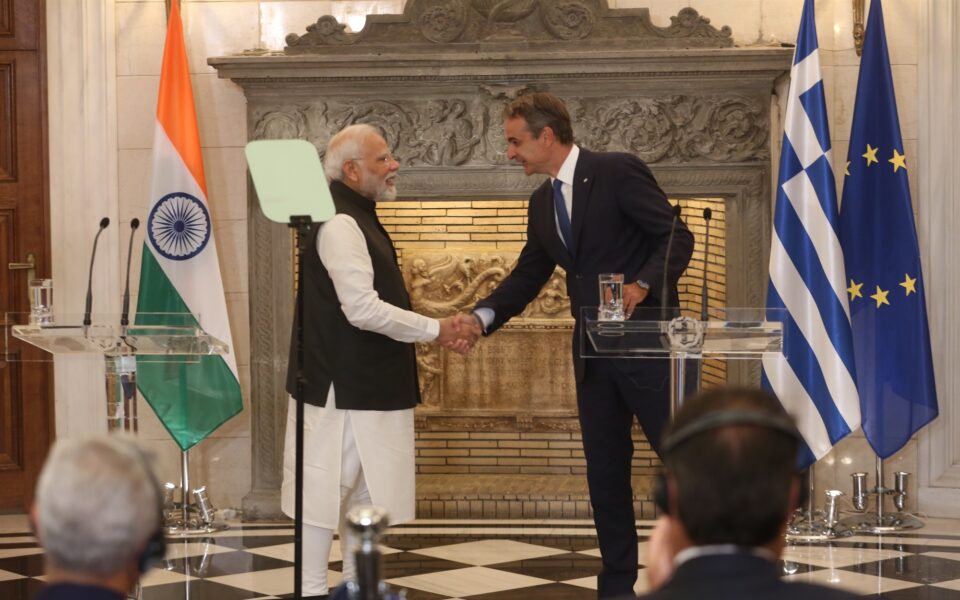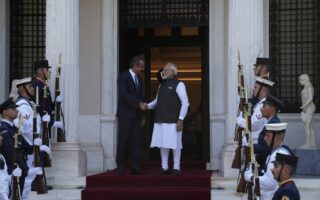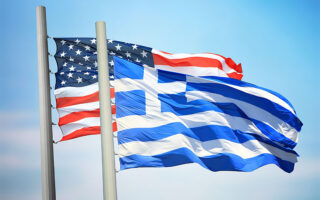Greece’s gateway to Asia, India’s gateway to Europe

The state visit by Greek Prime Minister Kyriakos Mitsotakis to New Delhi (February 21-22) will be another important step in building a strategic relationship between India and Greece – a process which began with the historic visit of the Indian Prime Minister, Narendra Modi, to Greece in August 2023.
This was a visit that led to considerable excitement in Greece at the highest political levels and among Greek business leaders who sensed the great opportunity that a strategic partnership with India provided. Ahead of the visit, Mr Mitsotakis told this writer that he is determined to deepen bilateral ties and cooperation in many fields, adding that “India will find no better gateway to Europe than my country and for Greece there is no better gateway to Asia than a close strategic relationship with India.” He said, “PM Modi’s historic visit to Athens created a momentum which I hope will be accelerated with my upcoming visit to [India].”
India is perceived as an old and traditional friend of Greece, but also as a rising great power in the fast-changing global scene.
Mr Mitsotakis will be accompanied by a high-level Greek business delegation comprising business leaders not only looking at India’s potential as their gateway to Asia but also as a manufacturing base for their global operations.
The importance of security and stability
Greece and India are in many ways ‘prisoners’ of geography. They are located in areas strategically important to the global system but are areas that are at the same time geopolitically volatile. As recent events in the Red Sea have shown, the security, stability and prosperity of the East Mediterranean region, where Greece is situated, is vitally dependent on the security, stability and prosperity of the Indian Ocean region.
More than ever before, the political leadership in India and Greece is aware of the compelling strategic reasons and urgency to build a strategic relationship between the two countries. Cooperation at various levels Bilateral strategic, military and business cooperation has been moving along over the years, but at a slow and unhurried pace.
The Indian Navy and Indian Air Force have been participating in joint exercises with the Greek armed forces and reciprocal exercises are planned from time to time. Businesses have also been looking at each other. An Indian construction company, for example, is involved with a major Greek Construction company in the building of a new airport on the island of Crete.
A well-known Indian business family has made major investments in several companies in the food business in Greece. A mid-sized Indian shipping company has already opened a brokerage firm in Athens and looks to become a key player in the trans-Atlantic shipping market. A large systemic bank in Greece has tied up with a major Indian financial institution to sell mutual fund products globally.
It is also interesting to note that Greece’s most important long-term foreign investor is Indian-Canadian billionaire Prem Watsa, founder and CEO of the Fairfax Financial Holdings. Mr Watsa often states that “Greece is still by far the best European country to invest in.” With knowledge of both countries, he has been a steady promoter of Greek-Indian business cooperation. But the question is, is this enough?
As economic reforms by the Mitsotakis government over the last five years push the Greek economy towards a more sustainable growth path, and as Greece positions itself as the reliable eastern flank of the European Union (EU) and the North Atlantic Treaty Organization in the Eastern Mediterranean, also building its defence industry, the idea of constructing the India-Middle East-Europe Economic Corridor (IMEEC) is gaining in salience.
It is hoped that Greek and Indian business will discover many more reasons to partner with each other. Greece has been a strong supporter of deeper EU-India relations and is now working to ensure the EU-India bilateral trade and investment agreement (BTIA) is rapidly concluded, which would be a further catalyst to bilateral economic ties. Scope for more links The value of closer people-to-people ties that will preserve the heritage of our ancient linkages must not be ignored. It must be ensured that there is an attempt to remain familiar to each other even while Greece and India modernise themselves.
There need to be more university student exchange programmes, more cultural exchanges and more media cooperation. Think tanks in both countries need to build more scholarship together. And, there definitely needs to be more travel links between the two countries. The fact that the political leaders of Greece and India are exchanging visits within a short time frame shows not just their determination to move the relationship forward but also the urgency they attach to this task. It is now for government policymakers and businesses to follow their lead.
The year 2024 is a critical one for the world and for Europe, and it has become a critical year in the building of the Greece-India strategic partnership.
This commentary by the Executive Editor of Kathimerini, Alexis Papahelas, appeared in The Hindu.





